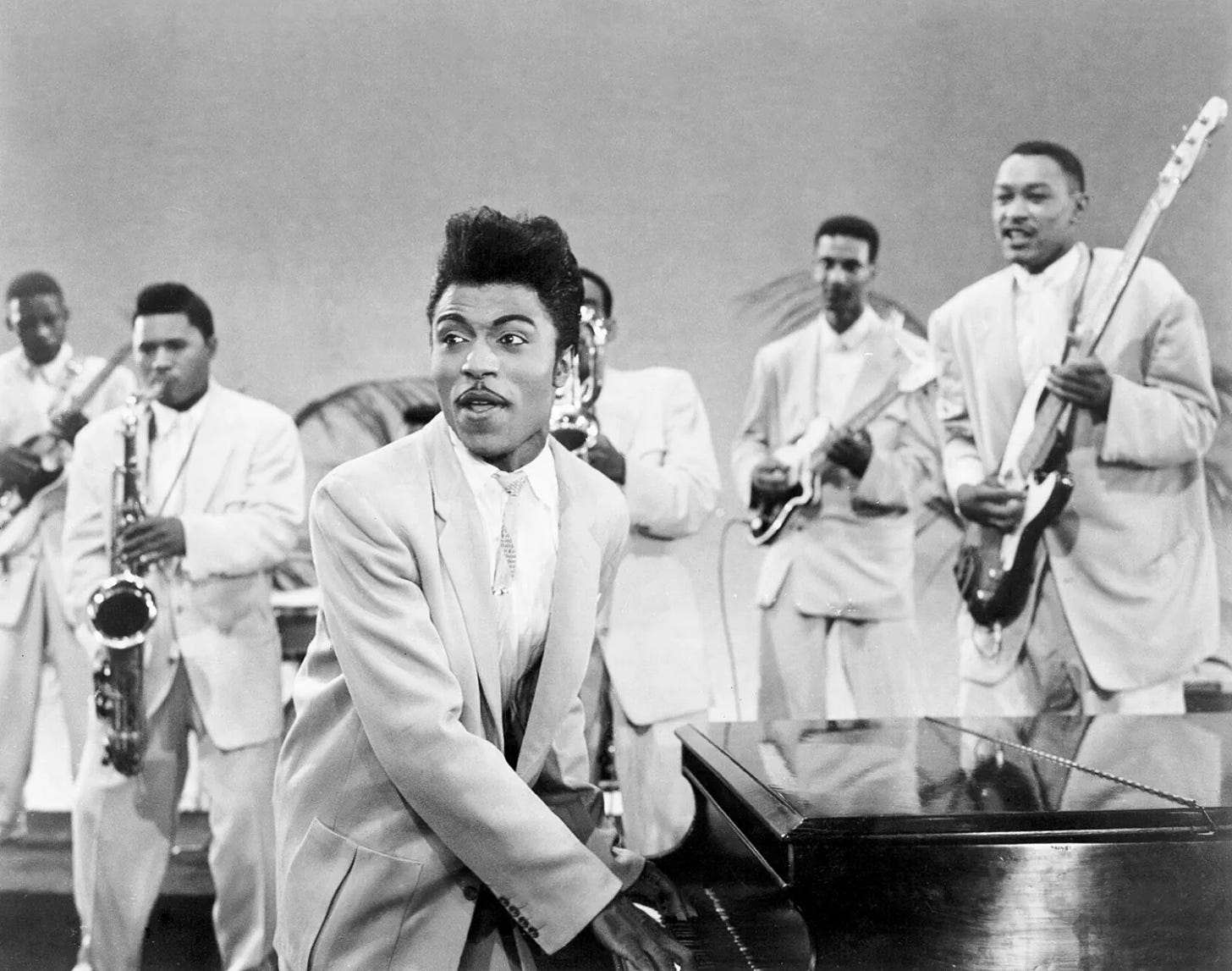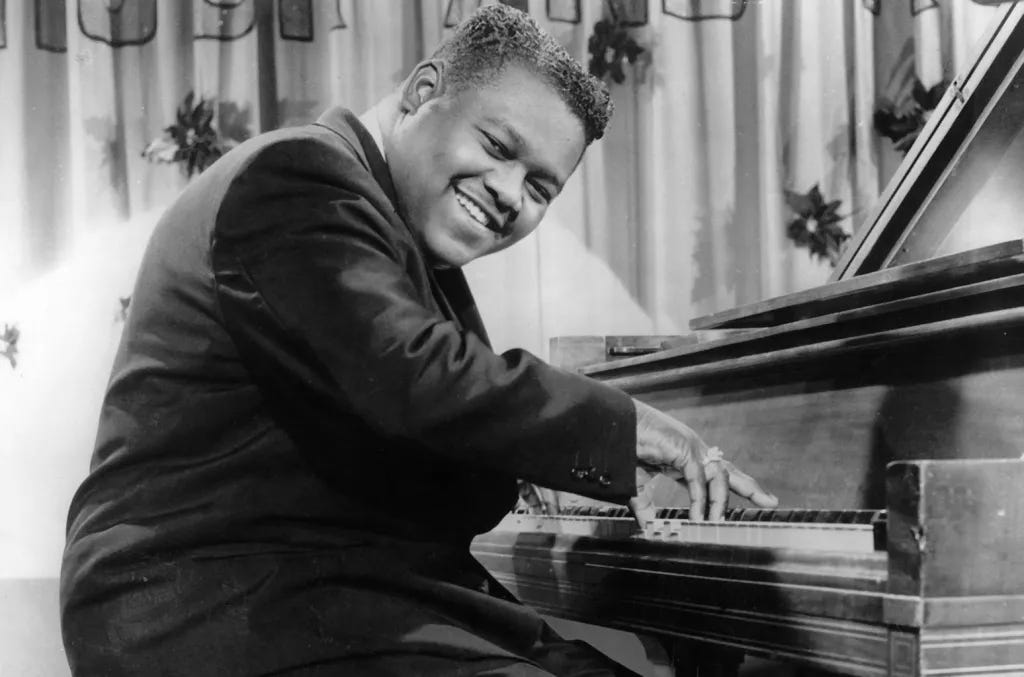Find an audio reading of this Black Eyed Story above.
The Beatles, arguably one of the most legendary rock n’roll bands in history, got its first big break from Little Richard, a Black queer man. Those four scrawny, hungry, talented, White, working-class Liverpool boys loved, loved, loved Little Richard, aka, The Architect, The Quasar, The Originator, The Georgia Peach, The King (and Queen) of Rock'n' Roll.
In a recent beautiful documentary about Little Richard’s rise and fall and rise and fall, the singer-songwriter claimed that he taught Paul McCartney everything he knows. With his face beat for the gods, he tells the listening audience:
He was standing in the wing of the stage, and I was there, 'woo!' (sings high note). He said, 'woo' (sings quietly out of breath). I said 'woo!' (sings high note). He said, 'woo, woo' (sings out of breath).
It’s a joke, but as with most jokes, it’s funny because something within it is absolutely true. Unfortunately, Ringo Starr didn’t understand the joke beneath the joke when he quipped:
"Well he didn’t teach [Paul] – that was always the joke! Paul just decided to, 'woo!' (sings high note). And, uh, Little Richard, from that day on, um, told him how he taught Paul to 'woo!' (sings high note).
Oh dear, dear, Mr. Starr – but which came first? Paul’s “woo" or Little Richard’s?
Blackness “light”, ie., a whitewashed parody or reinterpretation of Black culture…
There’s no rock n’roll without Little Richard, without Fats Domino, without Chuck Berry and hell, I’m just gonna say it – without Black folks. And yet, who would most Americans claim to be the King of Rock n’ Roll? That’s right, Elvis. It’s bewildering. How in the world did we forget who put the swivel into those hips?
And while I know most folks won’t think this matters, trust me, it truly does. We can’t put up signs that read Black Lives Matter without also recognizing that the art created out of the joy and pain of those Black lives is also worthy of dignity and protection.
In the Little Richard: I Am Everything documentary, there’s a brief interview with Pat Boone who became a megastar from Blackness “light”, ie., a whitewashed parody or reinterpretation of Black culture. His cover of Fats Domino’s Ain’t That a Shame and Little Richard’s Tutti Frutti made him an icon. However, when Fats and Little Richard first recorded their songs, they were released as “race records”. Not surprisingly, Pat Boone’s covers of both were not.
Little Richard explained what we don’t like to remember and I believe is still true to this day in America: “See, they didn’t want a Black guy to be the creator of rock and roll, ‘cause White kids liked it and they don’t want the White kids screaming over no Black boy.”
In a Variety magazine interview, Boone gave his version of this history:
But my versions of their songs became big hits and opened the doors for them to become the stars they so richly deserved to become. I like to say I was the midwife at the birth of rock and roll. In fact, there was no such thing as rock and roll. It was called “race music” and the artists were limited to their own stations and charts.
The interviewer pushed back on Boone’s recollection:
There’s an early interview with Little Richard where he complained that your records were in the stores and his records weren’t, but later he gave you a lot of credit for helping him break into the big time.
Boone responded:
Both Little Richard and Fats said they made more money from my versions crossing over into the mainstream. There’s an interview with Little Richard where he was asked about me and how he felt when he heard my version of his song and he said, “I was washing dishes at the Greyhound Bus Station in Macon [Ga.] and when I heard Pat Boone doing my song I threw down my towel and knew my time had come.”
The interviewer then told Boone:
Malcolm Gladwell said that while Elvis tried to imitate the Black artists, you never did.
Feeling vindicated by Gladwell’s assertion, Boone said:
Listen to Fat’s Domino’s “Ain’t That a Shame.” He rolls it. Then listen to mine. [Boone starts to sing his more staccato take on the song.] See the difference? I rock it.
Oh, I see the difference Mr. Boone. Fat’s wrote a song and sang it. You took that song and whitewashed it, then placed a thorny crown upon your head believing yourself to be Fats Domino’s and Little Richard’s (and I’m guessing all Black people’s) White Savior.
I think Taylor Swift is doing the progressive-liberal-best that a stunningly pretty, conventionally-thin, naturally-blonde, tall, blue-eyed, farm-raised,
Christian, billionaire woman can do.
So there’s been a debate about Taylor Swift and her role as a feminist (a label she only recently accepted after having conversations with Lena Dunham) and if she relies too much on her Whiteness and her femininity to preserve a kind of innocence that affords her a kind of protection and power that other creators like Beyoncé, SZA, and even pre-weight-loss Adele, don’t get to enjoy.
Listen, I’ma tell you straight: it’s an argument I don’t really care about. I think Taylor Swift is doing the progressive-liberal-best that a stunningly pretty, conventionally-thin, naturally-blonde, tall, blue-eyed, farm-raised, Christian, billionaire woman can do. She’s getting folks out for the vote and hiring queer and racially diverse dancers on her tours. She even took a stand against far-right, ignorant ideologies in her Netflix documentary. She’s done enough to have the far-right worried that she’s doing too much. But of course, folks have complained that she hasn’t done enough. To which I have to ask: What more should she being doing?






